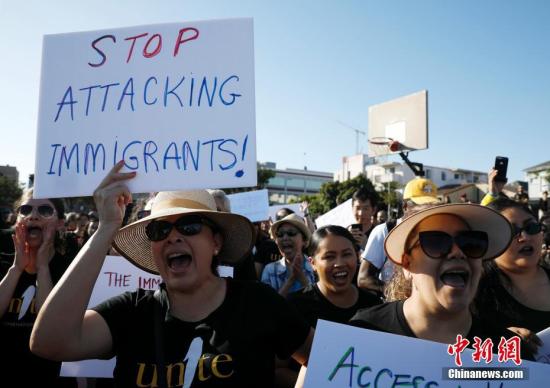Chinanews.com, February 24th. According to the US Chinese website, on the 24th local time, the US Department of Homeland Security's Immigration Office will begin to implement the new "public burden" regulations. Immigrants holding legal identity documents often apply for public benefits. It is possible Listed as "public burden". However, the New York Immigration Coalition says people need not panic too much.
Data map: On August 27, 2019 local time, hundreds of Asian immigrants and immigrant rights advocates held a rally in Oakland, California, USA to protest the Trump administration's new "public burden" regulations. Photo by China Press Agency reporter Liu Guanguan
According to reports, the New York Immigration Coalition (NYIC) has stated that it is already using public benefits, which does not mean that users must be judged as "public burden". The organization recommends that if the children of the affected public benefits are U.S. citizens, they can apply for these public benefits on behalf of their children to reduce the risks associated with the use of these public benefits.
At the same time, the organization said that the new "public burden" rules are not retroactive, and only apply to public welfare applications submitted after February 24. Applications that have been submitted for processing at the immigration office before this date, or before the effective date of the rules Postmarked applications are not subject to the new rules.
In response to the new "public burden" regulations, the China Policy Council (CPC) has also published a document saying that the new regulations will not change the eligibility of immigrants to use public benefits. These people will be deprived of their right to use public benefits. People do not need to withdraw from public benefits or avoid receiving medical insurance subsidies to circumvent the new "public burden" regulations.
In 2019, the US President Trump administration announced new rules for "public burden", which triggered many discussions. The new rule redefines public burden: a total of more than 12 months of benefits received in 36 months (two benefits received in one month) Counted as two months), non-citizens receiving one or more specific public benefits, including public cash benefits: any cash income benefits, supplementary social security income, temporary assistance to families in need, food stamps (SNAP), Section 8 Housing assistance, etc.
Critics argue that the new rules will target more low-income immigrant groups from non-English speaking mothers, which will put more burden on this group. New York, Vermont, Connecticut, and New York City have sued the Trump administration over new regulations on public burdens.
Federal judges have also issued orders stating that the new rules on public burdens cannot be enforced in New York, Illinois, and other places during the lawsuit. But the U.S. Supreme Court gave the green light for the Trump administration to implement the new rule in January 2020, with nine justices rejecting the federal judge's order in New York with 5 to 4.

